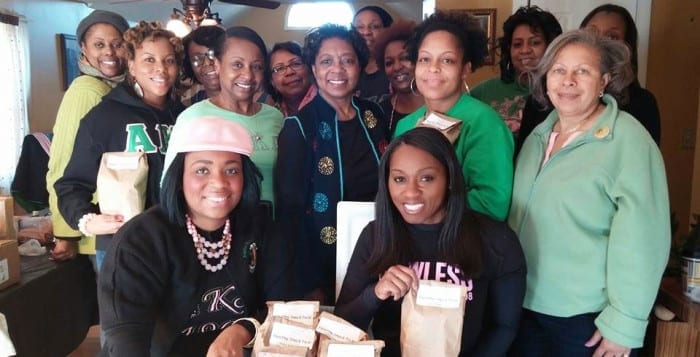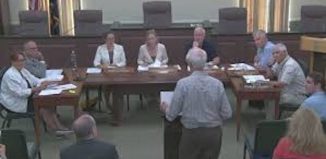Sorority gives back to Long Island neighborhoods
Giving back and making a difference in the community is what the women in the Sigma Psi Omega chapter of Alpha Kappa Alpha have strived for since June 23, 1990. But the quest to serve the community did not start with the chapter.
According to Alpha Kappa Alpha Inc., Howard University student Ethel Hedgeman founded AKA, the first African American sorority, on Jan. 15, 1908, in Washington D.C. Her goal was to unite like-minded women to help give back to those in need. One hundred years later, her efforts still drive members like Pleshette Shelton, the current president of the Sigma Psi Omega chapter in Bay Shore in Suffolk County.
“We went from doing 20 programs a year, to last year we did, I want to say 45,” Shelton said in a recent interview.
Shelton’s chapter was charted by 26 African American women in Hauppauge. Now, the local chapter doubled to include around 50 members. Although the women in the chapter are Suffolk County residents, this graduate chapter welcomes all AKA members regardless of which university they attended as undergraduate members.
Second Vice President Trina Gerrard, joined the sorority as a sophomore at Morgan State University in Baltimore, Md, before moving to Long Island and joining the local chapter. For Gerrard, a full-time social worker, what attracted her to the undergraduate sorority was not just the ladylike mannerisms of the members but also the services they did for their community.
Last month, the Sigma Psi Omega chapter celebrated its 25th year the day after providing its services on June 13 at the Tri Community Youth Agency in Huntington. They conducted a seminar for youths and their families regarding financial literacy and historically black colleges and nutrition, according to TRI CYA Director Debbie Rimler.
“Our center serves youth 5 to 21 years old,” Rimler said. “Most of them are at or below the poverty line. It’s great for these families to have this type of information available for them.”
For Sigma Psi Omega, the quest is to find those in need and help educate, feed and provide activities for them to learn, grow and enjoy. According to Shelton, some of these youths do not receive a hot meal during the weekends or holidays since some pantries do not serve on those days.
“I started to cry,” Shelton said when she learned these kids only have microwavable food when the pantries are not in service. “I waste so much food myself that here are families living in shelters and they’re hungry.”
It was one of many eye-opening experiences for Shelton.
“The question isn’t, ‘Why would you serve?’ It’s, ‘Why wouldn’t you want to?’” Shelton said.
Before providing its service, the chapter meets with Dorothy Buckhanan Wilson, the sorority’s international president. Wilson organizes the programs and identifies target communities before the chapter uncovers the communities that are most in need.
Their programs are not limited to financial literacy or historically black colleges. The chapter also organizes blood drives, arranges craft days where children can make pieces of artwork like paper mache flowers for Mother’s Day, provides information on going green, helps single mothers living in shelters and finds employment or career opportunities for the individuals they help among other services.
For the communities to which the chapter frequently provides its services, the women try to “piggy-back” off of what they taught the children on their previous visit while maintaining a light-hearted fun learning environment.
“You want to make sure you’re keeping it light because these kids are already going through a lot,” Shelton said.
Funding for these programs does not come from donations but out of pocket. Sigma Psi Omega chapter members are required to contribute some of their own money to gather appropriate supplies for each program they organize.
According to Gerrard, there is a high demand for the chapter’s services that “people are just waiting because they don’t have direction. They don’t know where to reach out to,” Gerrard said. As a result, some individuals respond within a week of the chapter reaching out to them.
On many occasions, the communities this chapter serves are not aware of information available on the importance of going green or managing finances. The sorority does not just give back by providing the programs, but they are also teachers to those who do not have access to various resources.
But like any other group, working with members of the chapter is not always easy.
“It’s a sisterhood. It’s a lifetime commitment so you get a lot of fulfillment,” Garrard said. “Sometimes you get frustrated … but you find the strength from each sister.”
The chapter has retreats where members can resolve tension and discuss and strategize plans for a program or community in need.
“Each community is different,” Shelton said. “Going in and finding what that need is and being able to help them succeed … even if it’s one life.”
Going forward, both Shelton and Gerrard want to continue their efforts and continue their founder’s purpose by helping communities that require their services.
“I think that it was phenomenal to have an organization that is still around for that long and it’s still growing strong,” Gerrard said. “It makes us know that whatever we are doing, we’re doing it for a cause and it’s … making our founders proud to continue their legacy.”







